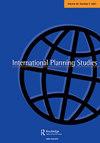Between normative product-oriented and alternative process-oriented urban planning praxis: how can these jointly impact on the rapid development of metropolitan Maputo, Mozambique?
IF 1.5
Q4 REGIONAL & URBAN PLANNING
引用次数: 4
Abstract
ABSTRACT This paper explores recent urban planning praxis in the metropolitan area of Maputo, capital of Mozambique – occurring in a context of high socio-spatial imbalance and rapid expansion. This involves different agents besides government institutions, at different stages. Based on relevant critical literature, the authors identify both a normative praxis, usually regulatory and product-oriented, and an alternative one, usually process-oriented, in urban development. In Maputo, the former is predominantly that which is regarded as ‘official’ and is linked to land titling, whereas the latter is closer to what actually happens ‘on the ground’ and often involves ‘unofficial’ land allocation. In reality both forms of praxis interact in complex ways. The paper draws on recent research and aims to better understand how these forms of urban planning praxis can both be developed to better address existing socio-spatial imbalances in a context of rapid urbanization – and hence has wider relevance for Sub-Saharan Africa.在规范的产品导向和替代过程导向的城市规划实践之间:这些如何共同影响莫桑比克马普托大都市的快速发展?
摘要本文探讨了莫桑比克首都马普托大都会区最近的城市规划实践——发生在高度社会空间失衡和快速扩张的背景下。这涉及到除政府机构之外的不同机构,处于不同阶段。基于相关的批判性文献,作者确定了城市发展中的规范实践,通常是以监管和产品为导向的,以及另一种替代实践,通常以过程为导向。在马普托,前者主要是被视为“官方”的,与土地所有权有关,而后者更接近“实地”实际发生的情况,通常涉及“非官方”的土地分配。事实上,实践的两种形式都以复杂的方式相互作用。该论文借鉴了最近的研究,旨在更好地了解如何发展这些形式的城市规划实践,以更好地解决快速城市化背景下现有的社会空间失衡问题,从而对撒哈拉以南非洲具有更广泛的相关性。
本文章由计算机程序翻译,如有差异,请以英文原文为准。
求助全文
约1分钟内获得全文
求助全文
来源期刊

International Planning Studies
REGIONAL & URBAN PLANNING-
CiteScore
4.60
自引率
4.80%
发文量
20
期刊介绍:
Planning, at urban, regional, national and international levels, faces new challenges, notably those related to the growth of globalisation as both an objective socio-economic process and a shift in policy-maker perceptions and modes of analysis. International Planning Studies (IPS) addresses these issues by publishing quality research in a variety of specific fields and from a range of theoretical and normative perspectives, which helps improve understanding of the actual and potential role of planning and planners in this context.
 求助内容:
求助内容: 应助结果提醒方式:
应助结果提醒方式:


